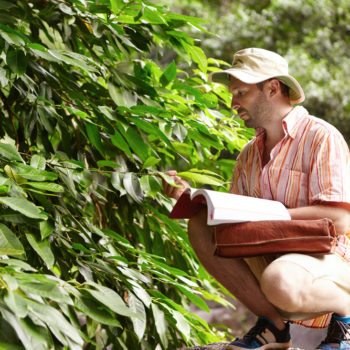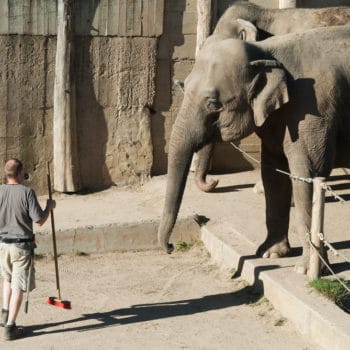Why We Love It
-
$54,970Potential Avg. Salary*
-
Growing DemandJob Outlook
* Salary & growth data is based on the recent Bureau of Labor and Statistics data published at https://www.bls.gov/oes/current/oes333031.htm for 33-3031 Fish and game wardens 11/2021. Based on national data, not school-specific information. Conditions in your area may vary.
If you’re interested in environmental conservation, renewable energies, and sustainability, a degree in environmental science may be right for you.
A bachelor of science in environmental studies spans the natural and social sciences, exploring concepts in urbanization, geography, geology, and engineering to prepare students for a wide variety of careers in environmental protection across various industries.
What is a Degree in Environmental Science?
Are you worried about the impact of urbanization on agricultural production or global warming? Have you always wanted to explore solutions for renewable energy, or are you interested in designing green buildings that utilize very few nonrenewable resources?
If so, you may enjoy a career in the field of environmental protection or education, and a degree in environmental studies is a great starting point for that career. In an environmental studies program, you’ll learn about the natural and social factors that strain and alter the environment.
In an environmental studies program, students take courses in both the natural and social sciences. They explore the economics of the oil industry; study the sociological factors that lead to littering, polluting, and resource overuse; and grow to understand in great detail the different climates and landscapes that compose the world.
This information can be used in a variety of careers after graduation. Graduates find jobs in environmental education, advocacy, conservation, construction, and engineering, among others.
Recommended Schools
What Courses Would I Take For a Major in Environmental Science?
- Environmental Science
- Environmental Conservation
- Environmental Geology
- Climatology
- Water Resources
- Renewable Energy
- Geographic Information Systems
- Urban Ecosystems
What Jobs Can You Get with a Degree in Environmental Science?
Demand for environmental studies graduates is expected to grow faster than average in the coming decade due to three major factors: the need for renewable energy, increased awareness of the importance of responsible land management, and an increased focus on environmental protection.
For this reason, environmental studies graduates shouldn’t struggle to find work in their field after graduation. They should find ample opportunities available in environmental protection roles.
How Long does it take?
A bachelors in Environmental Science will have a typical length of 4 years in a full time schedule. That said, there are many ways to speed up the timeframe by either taking more units via online coursework, community college, or taking free classes at OnlineDegree.com that could transfer to universities in the US.
Online Environmental Science Degree
Environmental science degree programs are often viewed as a practical science program- requiring completing labs and fieldwork courses. Accordingly, online degree programs are not common but they are still available at select universities (see a list below).
Earning this bachelor degree requires completing around 120 credit hours which can sometimes be achieved at an accelerated pace. These universities also offer master’s degree programs if you already have a degree in a field related to environmental science.
What Can You Do With an Environmental Science Degree?
Our planet has been changing rapidly recently placing difficult challenges against all living species. Accordingly, there is increasing attention towards the environment and how to develop eco-friendly systems that can still fulfill human needs. Environmental problems are diverse affecting the air quality, climate changes, pollution of the seas, radioactive wastes, disturbing the natural balance between species and much more.
As a result, studying environmental science is increasingly becoming more attractive to students. It is an interdisciplinary natural science that involves biology, chemistry, physics and informatics with the main aim of solving environmental problems and developing eco-friendly products.
These can include for example new sources of energy, more efficient ways of production or reducing the exhaust from industry or traffic. Environmental scientists can also work on understanding earth processes and deciding the best ways to manage the available natural resources.
What Will I Learn as an Environmental Science Student?
Environmental science is a challenging study based on its nature as an interdisciplinary science. Students are expected to complete courses from very different fields in order to have an integrated methodology to approach environmental challenges.
The following list shows a number of courses that are commonly studied in environmental science programs:
- Introduction to ecology: Ecology is studying how living species in a certain environment interact with each other and with the environment. Students will get familiar with concepts as ecosystems, populations and climate. They will also get to know how species adapt through evolution and behavioral changes to the environment. It is common to have field trips during this course to have practical experience of the concepts introduced.
- Water and the environment: Students study the hydrologic cycle and its effect on the climate. They also study the distribution of underground and surface water on earth. They will have more clearer view of issues as water quality, drought, future water management and allocation.
- Environmental Geology: this involves the study of minerals and rocks that make up the earth and how the composition of earth is affected by natural forces as water, wind and plate tectonics.
- The atmosphere and climate: this focuses on the composition of the atmospheric layers and how the atmosphere affects the climate on earth. It also includes concepts such as the energy transfer between the atmosphere and oceans as well as protecting the earth against solar radiation. Students will have a solid view of how human behavior affects the earth atmosphere and the impact of such changes.
- Wildlife ecology: this involves a brief study of the biology of the main groups of animals including mammals, birds, reptiles, fish and amphibians. Students get to know the importance of protecting biodiversity.
- Environmental Laws and Policies: this introduces the laws controlling air and water pollution, land use and management of hazardous waste. Students will also discuss how these laws are affected by cultural, political and economic aspects.
- Pathways to Sustainability Course: This is an interdisciplinary course that introduces a methodology for developing sustainable systems. It is more concerned with developing the student’s mindset towards developing eco-friendly solutions.
Now I Have the Environmental Science Degree…where can I work after graduating?
Environmental Science graduates have unique, integrated and comprehensive knowledge of environmental challenges. They are highly prepared to manage teams or collaborate with people from different disciplines to develop environmental solutions that cannot be reached with a single focus. There is increasing demand for environmental scientists in all fields including for example governmental authorities, industry and energy production.
The following are common career options that you may consider after completing your environmental science degree:
- Teaching: environmental sciences are broad and are currently more popular in high school and college programs.
- Environmental scientist: if you have a deep passion for the environment then you should direct your passion directly toward conservation of the environment. Scientists study the relations between climate, earth, water and biological systems. They also study the cause of changes or problems and possible ways of solving them.
- Environmental engineer: this is the last phase of developing environmental solutions which involves designing new efficient solutions and evaluating the developed product. Environmental engineers play an important role in industries, companies and governmental authorities.
- Some students choose to have more specialized role as a Zoologist or Hydrologist. This focus backed with comprehensive knowledge provides highly efficient approach to deal with specific issues.
Should I Choose an Environmental Science Degree?
If you are passionate and caring for our planet’s resources, enjoy a blended indoor/outdoor working environment, and eager to provide environmental solutions to the rising problems, then you should probably consider an environmental science degree.
Studying an interdisciplinary science widens your scope of knowledge and provides you with versatile learning skills. Graduates have unique analytical, problem solving and objective oriented approach to problems that can be useful in every situation we face.
Recommended Schools
Best Jobs for Environmental Science Degrees
With a bachelor’s degree in environmental studies, you should be able to find entry-level work in wildlife or environmental conservation, urban planning, or environmental education. Some students also pursue careers at zoos, national parks, or botanical gardens.
You may also want to consider pursuing a graduate degree to qualify for roles like environmental engineer, lawyer, architect, or to work as a college professor.
How to save time and money
Our mission is to help you to avoid paying full price for college. We want your Environmental Science degree to be affordable and accessible. Here’s how you could save:
Create Your Free SmartPlan

There are many ways to make college affordable and accessible.
That’s why we created a helpful tool called SmartPlan.
It’s free, and helps you find potential ways to save and tons of information about each school you’re considering
Think of it as your “college blueprint”, to help you instantly craft a path to your degree:
- Which Colleges Match Your Needs
- Ways You Could Save Time & Money
- Free Courses You Could Take for Credit
- Valuable Data and Insights on Each College
- Detailed Steps You Should Take!
See what’s possible for you and generate a free plan within just a few minutes
Create My SmartPlanYou Might also be Interested in
Many visitors who look for a degree in Environmental Science are also interested in the following degrees.










